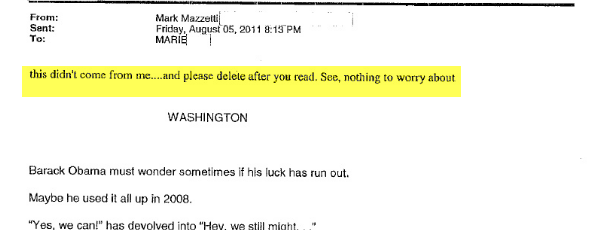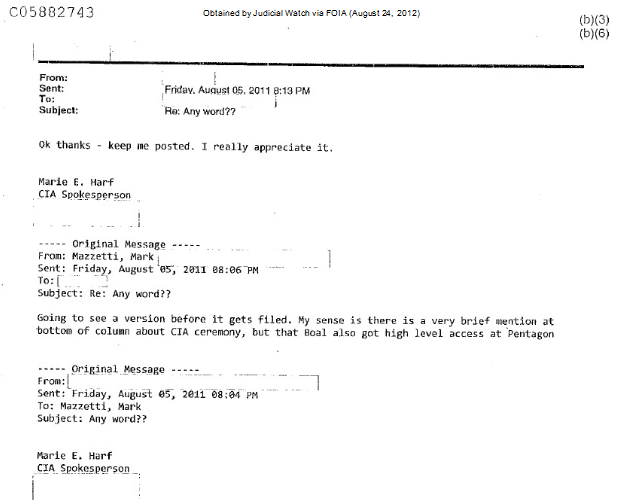Asked spooks to delete his emails after reading them; Paper claims correspondence was ‘mistake’
Steve Watson
Infowars.com
Aug 30, 2012
Emails obtained by advocacy group Judicial Watch have exposed the fact that a senior New York Times employee, who covers national security for the newspaper, provided the CIA with advanced copies of an article another writer was preparing that was somewhat critical of the White House over the upcoming Hollywood film about the killing of Osama bin Laden.
The reporter, Mark Mazzetti, forwarded an advance copy of a Maureen Dowd column to a CIA spokesperson a full two days before it was set to be published. The article, published August 7th 2011, discussed the upcoming Kathryn Bigelow-Mark Boal film “Zero Dark Thirty”, and criticized the Obama administration for having “outsourced the job of manning up the president’s image to Hollywood.”
Mazzetti’s emails (below) show that he sent the piece to the CIA’s Marie Harf, on August 5th 2011, writing: “this didn’t come from me… and please delete after you read. See, nothing to worry about!”

Harf had previously emailed Mazzetti asking “any word?” Mazzetti had replied, “Going to see a version before it gets filed. My sense is there is a very brief mention at the very bottom of column about CIA ceremony, but that Boal also got high level access at the Pentagon.”

Judicial Watch obtained the document via the Freedom of Information Act. The full email can be viewed here.
In response to the revelations, New York Times Managing Editor Dean Baquet told POLITICO Tuesday that it was “much ado about nothing”. However, later in the day, Times spokesperson Eileen Murphy sent a further email, claiming that Mazzetti had made “a mistake”:
“Last August, Maureen Dowd asked Mark Mazzetti to help check a fact for her column. In the course of doing so, he sent the entire column to a CIA spokeswoman shortly before her deadline. He did this without the knowledge of Ms. Dowd. This action was a mistake that is not consistent with New York Times standards.” Murphy wrote.
Readers will have a hard time believing this explanation. There was clearly a dialogue between Mazzetti and the CIA concerning the article. His request for correspondence to be deleted after reading, clearly indicates that he knew full well who he was sending the article to and that he could be landed in trouble if anyone discovered what he was doing.
It is blatantly clear that the CIA was leaning on Mazzetti, pressing him for information on what the Times was going to report, and that Mazzetti provided it. The fact that the CIA read Dowd’s column before her own editors did has severe consequences as far as freedom of the press goes, and should set alarm bells ringing.
In a piece in the London Guardian, Glen Greenwald cogently notes:
This exchange, by itself, is remarkably revealing: of the standard role played by establishment journalists and the corruption that pervades it. Here we have a New York Times reporter who covers the CIA colluding with its spokesperson to plan for the fallout from the reporting by his own newspaper (“nothing to worry about”). Beyond this, that a New York Times journalist – ostensibly devoted to bringing transparency to government institutions – is pleading with the CIA spokesperson, of all people, to conceal his actions and to delete the evidence of collusion is so richly symbolic.
The relationship between the New York Times and the US government is, as usual, anything but adversarial. Indeed, these emails read like the interactions between a PR representative and his client as they plan in anticipation of a possible crisis.
Regarding the Times’ initial response that it could not go into detail on the matter owing to national security, Greenwald notes:
…look at how the New York Times mimics the CIA even in terms of how the newspaper’s employees speak…This is what the CIA reflexively does: insists that, even when it comes to allegations that they have engaged in serious wrongdoing, you (and even courts) cannot know what the agency is doing because it is an “intelligence matter”.
Of course, the bigger picture behind this story is that while the Obama administration cited national security as a means of keeping details of the alleged Bin Laden raid under wraps, it simultaneously leaked supposedly classified security information to hollywood filmmakers, blatantly for propaganda purposes, in order to glorify the president on the big screen.
The entire scripted piece may fall flat on it’s face, however, given that one of the Navy Seals involved in the raid now says that Bin Laden, if you can believe he was present at all, was already dead from crossfire when the elite soldiers reached him. This description completely contradicts the official line that he was shot in the head after refusing to surrender and reaching for a weapon.
The New York Times has a long history of acting subserviently to the powers that be, rather than holding them to account.
Only last week we reported on the fact that the Times demonstratively scrubbed a passage in an article which revealed that the CIA was helping funnel arms to rebel groups that have aligned themselves with Al-Qaeda terrorists in Syria.
Just last month, it was revealed that the Times, as a matter of course, allows the Obama administration control over quotes from public officials that it can and cannot publish.
It was The New York Times that was at the forefront of the dissemination of what turned out to be completely false intelligence pertaining to the presence of weapons of mass destruction in Iraq. Reporting that contributed to almost a decade of war and the deaths of thousands, if not millions of innocent Iraqi people.
It was the New York Times that first learned of the NSA’s illegal wiretapping program aimed at innocent Americans in 2004. The paper sat on the story for a year after it was instructed to do so by the White House, in order not to affect the outcome of the election.
The Times routinely allows the CIA to vet the details it plans to publish from Wikileaks’ obtained material.
The Times obediently followed orders to conceal the identity of CIA spy Raymond Davis, when he was arrested by Pakistan. When Obama lied to the nation and described Davis as a US diplomat, the NYT printed his words as the truth, without question.
Glenn Greenwald again:
And that’s all independent of the chronic practice of the NYT to permit government officials to hide behind anonymity in order to disseminate government propaganda – or even to smear journalists as al-Qaida sympathizers for reporting critically on government actions – even when granting such anonymity violates its own publicly announced policies.
What all of this behavior from the NYT has in common is clear: it demonstrates the extent to which it institutionally collaborates with and serves the interests of the nation’s most powerful factions, rather than act as an adversarial check on them. When he talks to the CIA spokesperson, Mazzetti sounds as if he’s talking to a close colleague working together on a joint project.
It sounds that way because that’s what it is.
The Times was the vital cog in the CIA’s Operation Mockingbird, a secret campaign conceived in the 1950s to influence media output. Many believe, with some justification as we have seen, that Mockingbird continues to this day.
In a groundbreaking expose entitled ‘The CIA and the Media’, penned in 1977 for Rolling Stone, Carl Bernstein wrote:
The New York Times — The Agency’s relationship with the Times was by far its most valuable among newspapers, according to CIA officials. [It was] general Times policy … to provide assistance to the CIA whenever possible.
… CIA officials cite two reasons why the Agency’s working relationship with the Times was closer and more extensive than with any other paper: the fact that the Times maintained the largest foreign news operation in American daily journalism; and the close personal ties between the men who ran both institutions … .
Referring to Frank Wisner, the head of the Directorate of Plans of the CIA throughout the ’50s, writer Deborah Davis wrote in her 1979 biography of Washington Post owner, Katharine Graham:
By the early 1950s, Wisner ‘owned’ respected members of The New York Times, Newsweek, CBS and other communications vehicles. Wisner referred to this apparatus as a “Mighty Wurlitzer”, referencing the theater organ capable of controlling diverse pipes, instruments, and sound effects from a central console.
Of course, it is not only the NYT that lies in bed with US intelligence. Sadly most of the nation’s mainstream media is now almost wholly controlled by the trifecta of political, military and intelligence elites.
—————————————————————-
Steve Watson is the London based writer and editor for Alex Jones’ Infowars.com, and Prisonplanet.com. He has a Masters Degree in International Relations from the School of Politics at The University of Nottingham in England.
The Emergency Election Sale is now live! Get 30% to 60% off our most popular products today!


